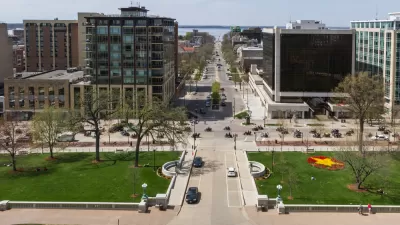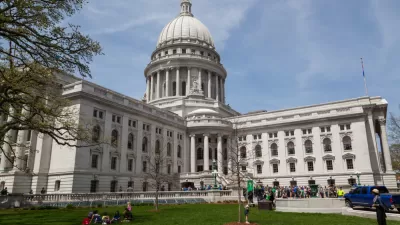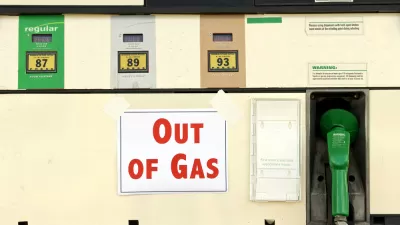WI Gov. Scott Walker's proposal is to sell-off state assets, primarily state power plants to finance his transportation plan, thus linking rate payers with funding road projects. His transportation commission recommended raising the gas tax and fees.
In yet another example of a governor resorting to extreme measures to avoid doing what the experts recommend - raising the state gas tax or other road user fees - Wisconsin Governor Scott Walker seeks "to sell the 37 power and heating plants" to finance his two-year $6.4 billion transportation plan. Patrick Marley, Jason Stein and Don Walker write that such a "move could also have the unexpected effect of linking the prices paid by some utility customers to the financing of the state's road system".
Presenting the broad outlines of his roads plan, Walker said he will not recommend raising the gas tax or vehicle registration fees - ideas advocated by a commission he and legislators set up two years ago.
By increasing user fees such as gas taxes, vehicle registration fees, and road tolls - a 'pay-as-you-go' approach to financing the plan would be possible. Walker is opting for a bonding approach - dependent upon selling state assets, according to what was told to Assembly Speaker Robin Vos (R-Rochester) by the Walker administration.
The power plants serve University of Wisconsin campuses and state prisons. A Republican state senator skeptical of the plan asked how the sale would affect the rates that the state pays for utilities and "ordinary ratepayers unconnected to the state".
The proposal is somewhat reminiscent of another state sale of a state asset: the 2006 leasing of the Indiana Toll Road to a private consortium. In that case, drivers on the toll road, rather than utility payers, would be tied to financing a 10-year state transportation plan.
The proposal needs legislators' approval - and ensuring a competitive process for selling the assets may secure it. Approval by the state Public Service Commission is not needed according the governor - but refuted by others as they are charged to determine if "if projects are 'in the public interest'".
In fact, such a sale could make sense as the facilities are aging, in need of upgrade, and may need to be converted to burning natural gas or biomass from coal, according to the JS reporters. Whether revenues be dedicated to road projects that have a dedicated steady, if declining revenue stream is another matter.
Unlike most other states, the state gas tax had been indexed to inflation according to the Wisconsin Dept. of Transportation (PDF) - but "(t)he Legislature froze the state gas tax at 32.9 cents per gallon in 2006". According to the Tax Foundation map, it is the fourteenth highest in the nation.
The 'path not taken' by Gov. Walker is one just taken by fellow Republican Gov. Matt Mead of Wyoming on Feb. 15 when he signed a substantial state gas tax increase bill of 10-cents or 71%. AP via the Casper Star-Tribune Online wrote that the governor "says the state can no longer afford to subsidize the transportation department from general funds." The entire hike goes into effect on July 1, resulting in a total state excise tax of 24 cents.
FULL STORY: Scott Walker's transportation budget might include sale of state power plants

Alabama: Trump Terminates Settlements for Black Communities Harmed By Raw Sewage
Trump deemed the landmark civil rights agreement “illegal DEI and environmental justice policy.”

Study: Maui’s Plan to Convert Vacation Rentals to Long-Term Housing Could Cause Nearly $1 Billion Economic Loss
The plan would reduce visitor accommodation by 25% resulting in 1,900 jobs lost.

Why Should We Subsidize Public Transportation?
Many public transit agencies face financial stress due to rising costs, declining fare revenue, and declining subsidies. Transit advocates must provide a strong business case for increasing public transit funding.

Wind Energy on the Rise Despite Federal Policy Reversal
The Trump administration is revoking federal support for renewable energy, but demand for new projects continues unabated.

Passengers Flock to Caltrain After Electrification
The new electric trains are running faster and more reliably, leading to strong ridership growth on the Bay Area rail system.

Texas Churches Rally Behind ‘Yes in God’s Back Yard’ Legislation
Religious leaders want the state to reduce zoning regulations to streamline leasing church-owned land to housing developers.
Urban Design for Planners 1: Software Tools
This six-course series explores essential urban design concepts using open source software and equips planners with the tools they need to participate fully in the urban design process.
Planning for Universal Design
Learn the tools for implementing Universal Design in planning regulations.
Caltrans
Smith Gee Studio
Institute for Housing and Urban Development Studies (IHS)
City of Grandview
Harvard GSD Executive Education
Toledo-Lucas County Plan Commissions
Salt Lake City
NYU Wagner Graduate School of Public Service





























